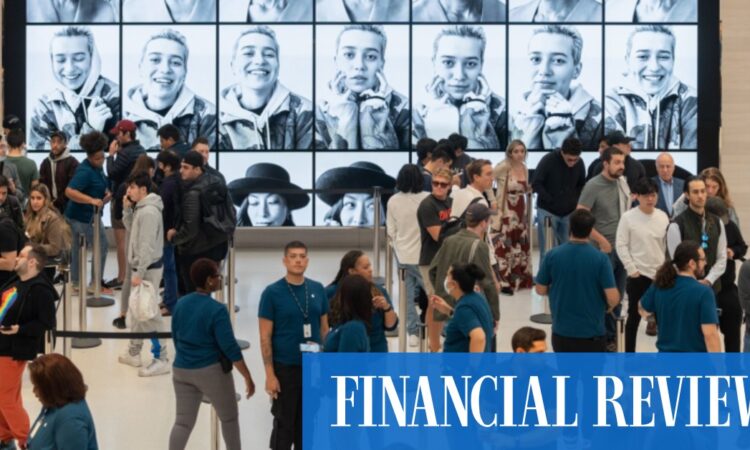
Right now, the US economy appears to be speeding up rather than stalling. Growth is forecast to accelerate in the third quarter on the back of a recent pickup in household spending, which jumped in July by the most in six months. But to some analysts, it looks a bit like a last hurrah.
“The big question is: Is this strength in consumption sustainable?” said Anna Wong, Bloomberg Economics’ chief US economist, who expects a recession to start by year-end. “It is not sustainable, because it’s driven by these one-off factors” – notably a summer splurge in the northern hemisphere on blockbuster movies and concert tours.
The enduring strength of the US job market has propped up household spending in the face of the biggest price increases in decades. It’s led some analysts to push out their expectations for a recession – or even scrap them altogether.
Economists at Goldman Sachs expect the consumer to outperform yet again in 2024 – and keep the economy growing – amid steady job growth and pay increases that beat inflation.
Headwinds looming
But there are plenty of headwinds looming. Researchers at the Federal Reserve Bank of San Francisco say the excess savings that have helped consumers get through the price spike will run out in the current quarter – a sentiment that three-quarters of the survey respondents agreed with.
“There’s increasingly an issue where the lower end of the income and wealth spectrum is really struggling with the accumulated inflation of the last couple years,” while wealthier Americans are still cushioned by savings and asset appreciation, said Thomas Simons, Jefferies’ US economist.
In the aggregate, consumers have been able to bend under the weight of higher prices, he said. “But there will come a point where that’s no longer feasible.”
Delinquency rates on credit cards and auto loans are rising, as households feel the financial squeeze after the Fed raised interest rates by more than 5 percentage points. And student loans are about to come due again for millions of Americans who benefited from the pandemic freeze on repayments.
A majority of investors in the survey pointed to the declining availability and soaring cost of credit, with mortgage rate near two-decade highs, as the biggest obstacle for consumers in the coming months.
Some three-quarters of respondents said auto or retail stocks were the most vulnerable to declining excess savings and tighter consumer credit which was not entirely priced in by the markets. While General Motors and Ford have essentially missed out on this year’s wider sharemarket rally, Tesla more than doubled in value.
Since the economy’s fate hinges on what US consumers will do next, investors are looking in all kinds of places for the answer. Asked what they consider a good leading indicator, respondents pointed to everything from the most standard measures – like retail sales or credit-card delinquencies – to airline bookings, pet adoptions, and the use of buy now pay later instalment plans.
“The traditional playbook for the economy and markets is challenging in this post-pandemic environment,” said Keith Lerner, co-chief investment officer at Truist Wealth. “Things are just taking longer to play out.”
Bloomberg
Bloomberg






